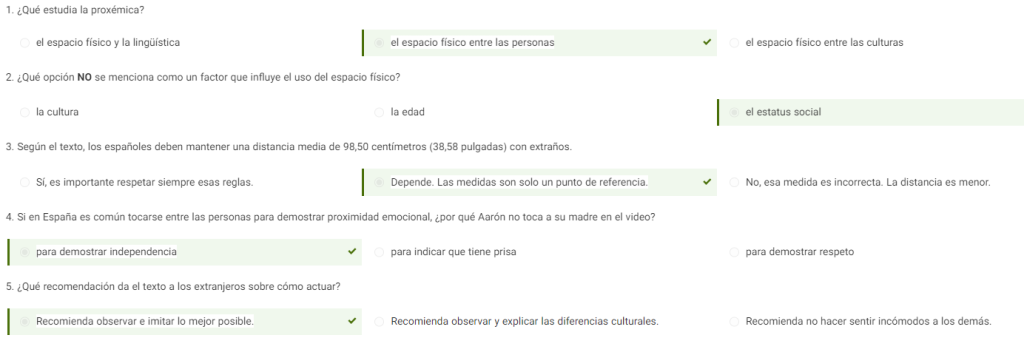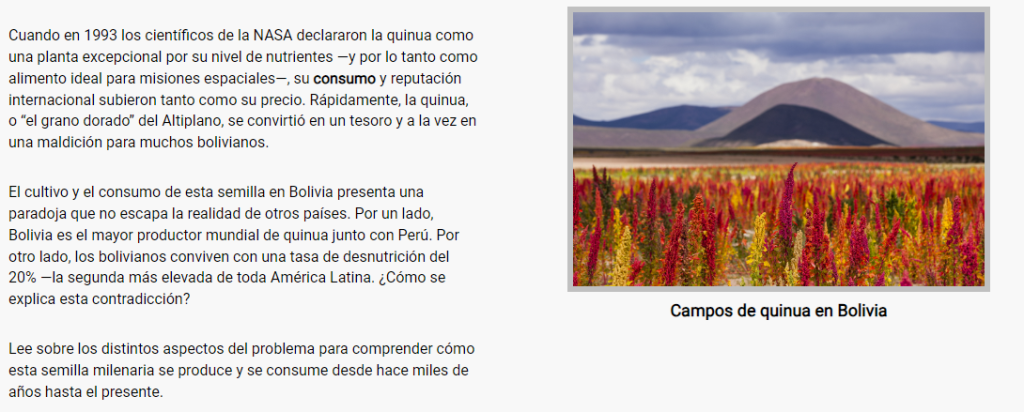Interpretive, Interpersonal, and Presentational Modes of Communication
Exploring Culture
Practices that helped me gain an understanding of cultural perspectives are the cultural exploration assignments in Lingrohub. These assignments would have us read excerpts from native speakers sharing information about their culture and answer comprehension questions.
These practices helped me better understand the values, attitudes, and Hispanic culture as I was getting information and experiences from native speakers from those exact cultures. They challenged my worldview because they are different from the culture I live by in America, especially with family relationships or certain foods and customs. Ultimately, learning about any culture really opens up my perspective, and it gives me new information and values that I can learn and apply to my life, or at the very least, I can be empathetic to why those values are held by that culture. As with Hispanic stereotypes, I don’t really have too many about Hispanic people, but it also helped put the amount of negative stereotypes that they do face in perspective for me. I hope that by continuing to educate myself about different cultures, I can avoid internalizing any stereotypes.

Engaging in Communities
It is invaluable to be constantly engaging with our close community but also our global community. As mentioned above, cultures come with values and beliefs that are held by a group of people. In order to understand these people and why they act or behave the way that they do, we have to be able to understand their culture and their livelihoods. By being able to understand many different cultures and perspectives we can communicate better and work together to find solutions for problems in our own communities and all of our communities together.
With my current job at a local pet shop, I have been able to participate in several communities through events and people who come through the store. For example, a lot of the events that we have are adoption events and which we meet people, understand their livelihoods, and work to solve a problem which is animal homelessness. If anything, I believe that animals truly do bring people together from all walks of life.
Interpersonal Communication
The TalkAbroad assignment that I did this year was about stereotypes in communities, and the second one was about influencers in society. The conversations were 15 minutes long each, and I strived to maintain a balanced conversation in which I talk just as much, if not more as my native-speaking partner.
The TalkAbroad activity really puts you in a spontaneous position where you are using your Spanish in a pretty real-world setting, without going to the country itself. Being able to understand different partners from different countries was also a struggle for me, but ultimately sticking to the vocabulary that I knew and being able to recognize key words or concepts and sentences was what helped me get through the conversation. Whenever we would upload a project we had to comment on each other’s projects. I believe that I was able to learn a lot from my peers in the projects that they had, and being able to talk with each other about things we did well or things we may need to improve on was really beneficial for my future projects.
https://drive.google.com/file/d/1oe-8Keuz86ArG1-mKhvdL-VXEfvB-d–/view?usp=drive_link
Presentational Speaking
Many of our projects required us to provide pictures or videos and provide a commentary sharing our experience or explaining certain concepts. For example, we did projects about influencers we like or stereotypes in our community.
The first presentational project that I worked on in the semester was talking about stereotypes. The hardest part of this unit was using the subjunctive tense in appropriate places. However, I feel that I was able to ultimately broaden the topics that I could talk about and the vocabulary that I used.
The second presentational project that we worked on was analyzing literature in Spanish and poems. I really enjoyed this assignment, but I think the hardest part that remains for me is being able to understand Spanish and a subjective tense rather than talking about facts. I think that the more I put myself in a Spanish mindset and understand the vocabulary, the better I’ll be able to understand more of the subjective literature in Spanish.
Our third presentational project was about transformative moments in our lives. This assignment really helped me be able to talk about myself, as well as use different past tenses such as the preterite or the imperfect. while that still is a struggling area for me, this assignment really pushed me out of my comfort zone and allowed me to understand more fundamentally the difference between the two past tenses.
The last presentational project we worked on was talking about influencers in society. I really enjoyed this topic because it’s especially relevant in modern society with the amount of social media we have. ultimately, I feel that I still struggle with using direct or indirect object pronouns, and I think that just by practicing and using them more in conversation, I could be more comfortable with them.
https://drive.google.com/file/d/1efXTQJwUVgYfx7XgNHyUAxYA0o-_3S7z/view?usp=drive_link
Presentational Writing
Throughout the semester we practice presentational writing through formal composition times in class. we would complete a presentational speaking part of the project which we submitted online, and then in class, with the same topic and vocabulary, we have to write a short essay answering questions in regards to that unit.
I really enjoyed the comprehension and presentational writing that we did in class. I feel that it was a great way to really test my Spanish unfiltered and see where I’m naturally better or weaker. I think that I was able to notice within each assignment that I really struggle with using grammar, specifically changing between tenses and knowing when to use which one. For example subjunctive tense has always been very difficult for me, and understanding when to use it, not necessarily how to form it. The writing part has come a lot easier to me, but I think the most beneficial part of these assignments was being able to get our rough drafts marked and circled on areas that were incorrect. While the answer was not given to us, being able to find and understand why certain words were wrong was really beneficial in helping me understand where am I thinking maybe flawed, and choosing certain tenses and whatnot. It also makes it a lot easier for me to remember when I have to use that tense or word the next time.
U19-Written-ProyectoInterpretive Listening
Some examples of interpretive listening activities that we did during the semester were watching videos of native Spanish speakers and natural contexts. Being able to understand how Spanish is naturally spoken, and getting used to how it flows is really important to be able to follow speakers and the direction of their conversation and understand the meaning they’re trying to convey.
One example of interpretive listening was when we watched a video of a restaurant owner talking about the foundation of his restaurant and the motivations for the type of food he cooks. The setting he was performing in was a TED Talk, and so the Spanish was formal but it still moved quickly and really required me to listen and understand where his conversation was going. another way we listened interpretively was by watching a video of a couple who talked about stereotypes of being in America coming from a Spanish-speaking country. This really required me to be able to listen for the subjective tense and understand what it means when they use it. I feel that I’m a lot more comfortable with listening to Spanish and being able to understand what I’m hearing, but I still think the biggest struggle for me is being able to do so at even a moderate or natural speed for Native Spanish speakers.
Interpretive Reading
A lot of the cultural exploration or other materials used for assignments required us to be able to read in Spanish but be able to do so and gather vital information to answer questions. Some readings were stories that tried to show a beginning and an end to demonstrate tenses. Other readings were more factual and analytical, which helped us learn how to find and gather information from Spanish lessons.
The most challenging part of interpretive reading is understanding certain words and determining the sentence. The hardest part is when there are certain words or certain tenses that I don’t understand, and those exact words are essential to finding the meaning in the sentence or the critical information. Overcoming this difficulty, I stuck with what I did know and went from there. If I can understand enough of the context, I can figure out what that word means to determine the rest of the sentence’s meaning. With each assignment, I’ve been more analytical and more critical of how much I genuinely try to understand from each reading and being able to read the entire excerpt.
